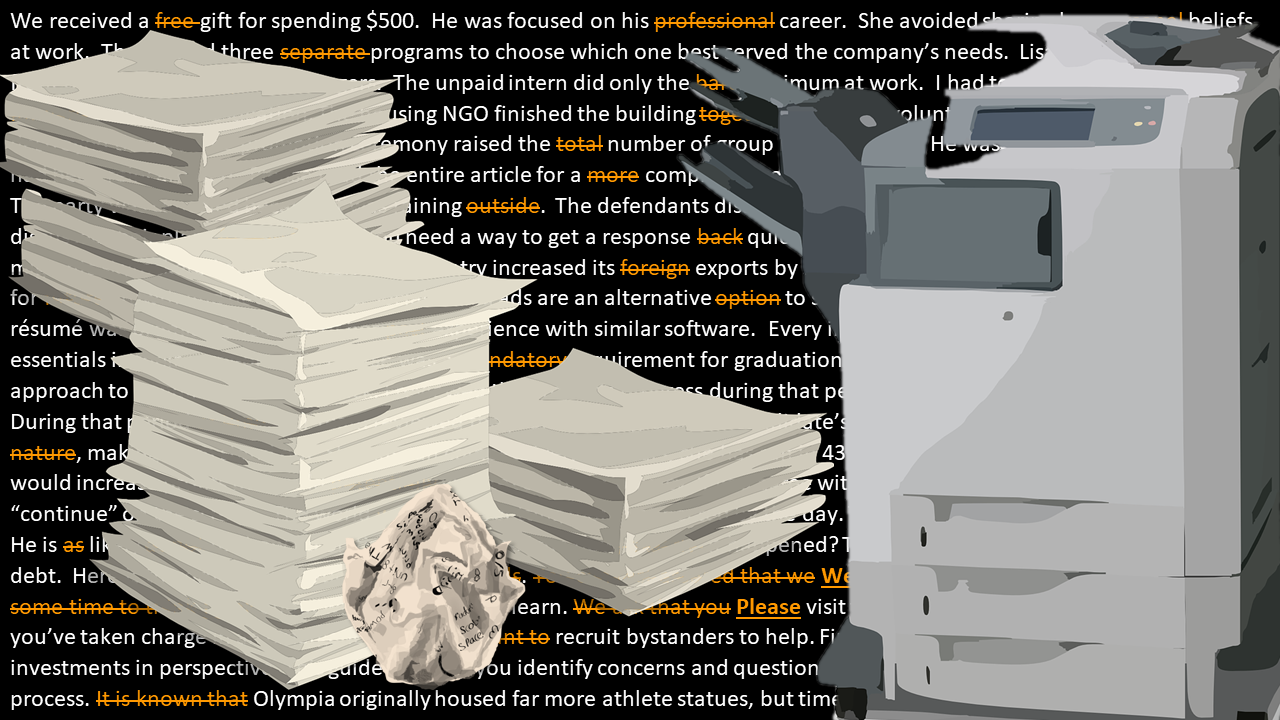It’s common writing advice: Avoid redundancies. Redundant writing dilutes our message, kills subtlety, and wastes space and time. The words you waste with redundant language could be better used for examples to support your ideas or details that drive your point home and make it memorable. But redundancies are hard to spot without thinking deeply about every word in every sentence.
Continue readingGiving and receiving feedback on our writing is as much emotional work as it is intellectual. Writing is a process of opening one’s thoughts to examination and critique by whoever reads it, and whether we are deeply invested in the topic or creating a routine work report, it’s an exercise in vulnerability. Author and writing teacher Erin Lebacqz describes the editing and feedback process, and what we can do to be better at giving and receiving recommendations.
“Documents in our agency literally go through six rounds of edits!”
“My supervisor redlines my writing, but it feels like her comments are just based on personal style or preference!”
“I’ll submit a draft, and my direct supervisor will say he wants it one way, while the next level supervisor will say she wants it an entirely different way!”
Continue readingIf your job requires you to write regularly, consider your readers and today’s changing exposure to words when drafting your work. With every day’s onslaught of content from emails, text messages, social media, and meetings—both on and offline—modern office workers don’t have the time or patience to read unnecessary words to get to your point. Wordy writing is a great way to get someone to close an email or dump a proposal without finding out what it’s about.
Continue readingEffective business communication relies on clear, concise, specific, and meaningful writing. Clichés fail all four requirements. In your first draft, a cliché may feel so easy and familiar to write that it seems irreplaceable. But, upon revision, you’ll see that clichés are unoriginal, broad generalizations—and often redundant. Delete them. Replace them. Your readers will reward you with their attention.
A major advantage of eliminating clichés from your business writing is the clarity and precision it brings. Without the clutter of overused phrases, your writing will be more persuasive and impactful, and you’ll be seen as more authentic, authoritative, and trustworthy.
Continue readingBeing understood in writing can be complex. The words we use express our expectations and tone, but readers often misinterpret the intention the author wishes to convey. In this edition of our business writing education series, author and book coach Anne Janzer explores how our expression of authority can unintentionally derail teamwork, and what to do about it.
Antonio manages a distributed team with people in different time zones. The team interacts daily through emails or messaging.
Antonio is frustrated that the team doesn’t collaborate well unless they’re all in a room together. When he tosses out an idea over email, either everyone agrees, or no one responds.
Continue readingIt’s one thing to want to communicate clearly, but knowing how to do it is a different matter. The International Organization for Standardization (ISO) made it easier last month by releasing Plain Language standards. These standards supply a framework for governments and private entities to make their publications more accessible.
Continue readingBusiness and legal documents must be precise, clear, and carefully structured because they serve as legal records, define relationships, and document important decisions. But writing in these fields is rarely done alone. A combination of authors, resources, and tools contribute to the final document. Subtle adjustments can change meaning or transform a good piece into an exceptional one. Tracking the evolution of a document and the source of changes is important to understand how and why the document changed so you can make sure it doesn’t drift from its goals.
Continue readingSomething feels off about your new robot co-worker—besides the fact that your co-worker is a robot. This robot produces grammatically correct text at lightning speed. The writing seems natural, not robotic. It’s impressive, but is this text good and should you adopt it as your own?
Continue readingWhen you’re writing for work, it can be tempting to show off. Big words and elaborate details make us feel confident, certain that they make us seem smart and impressive. In reality, overly complex writing can make your work hard to understand, or worse, too much of a bother to read. Author and writing teacher Erin Lebacqz investigates what can go wrong when we write for ego rather than expression, and how to keep our words simple and clear.
Continue readingIntensifiers are like vitamins— they’re meant to strengthen but become poisonous when you exceed the recommended dose. Let’s save you from your childhood writing (and chewable vitamin) mistakes.
Intensifiers are words or expressions designed to intensify the words around them, but often have the opposite effect. They are usually adjectives and adverbs, and they are particularly bad when used to modify absolute words. Common intensifiers include very, really, incredibly, and extremely.
Continue reading











